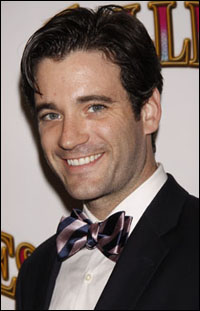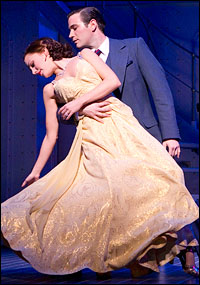
*
Both shows are billed as musical comedies, but are worlds apart. The Cole Porter score of Anything Goes is all champagne and broad strokes, while the songs by Stephen Sondheim in Merrily are touched with acid, regret, sorrow and — by the end of the show, blessedly — optimism. The Porter show from 1934 just wants to have fun and get to the next fizzy show tune while Sondheim (from 1981, and revised in the 1980s and '90s) ruminates on the choices made by its conflicted characters. And, to complicate matters, Merrily's story is told backwards, from the 1970s to the 1950s.
In the days leading up to the Feb. 8-19 New York City Center Encores! run of Merrily, we spoke to Donnell about the challenges of playing Franklin Shepard, a golden-boy composer and producer who loses his commitment to art, ideals and friends (played by Lin-Manuel Miranda and Celia Keenan-Bolger) as the days go by.
Merrily We Roll Along is complicated for you in two ways — by the structure of the piece, which moves from "present-day" to past, but also by the shortness of the time you have in the Encores! rehearsal process. I'm wondering how you address building a character in that limited time frame. Do you throw process out the window and focus on mechanics?
Colin Donnell: In the normal process we have, you know, maybe a week or two of being able to sit down at a table and discuss things — read through the script several times. We just don't, unfortunately, have the luxury of that. But, there's something kind of freeing in it, also. Because there's so little time to think, so much of it is based on instinct and what [director] James [Lapine] throws at us and our first impressions of these characters — which, I think, is somehow really well suited for the piece.
It's a tricky piece. These are not easy scenes to play. So, what's been kind of cool is figuring out how to navigate ourselves through all of that stuff. It's been a bit of a mind-warper, but it was so cool to see how all of the scenes actually piece together, and to see how moving the piece was, and see how clear we had made it in such a short period of time. James Lapine worked with Sondheim and librettist George Furth to revise the 1981 script and score into something more refined in the mid-1980s, and it was further revised in the 1990s. What was James' primary advice to you?
CD: I think our main goal — and his main goal — has been to make these characters as human as possible and make them as accessible as possible for an audience. It's been a wonderful thing for us to sort of key into: finding who these people are, what their friendship is and how much love they have for each other. Not just within the trio [of Frank, Mary and Charley], but also bringing in Gussie and Joe and Beth and finding out how real we can make these people as individuals, and how real we can make the relationships.
I guess you will keep finding things out during the run. The run will be a chance to grow the roles.
CD: I think so. I certainly think the hope doing any piece is that you are able to find new things as you go along. But, certainly, when you only have 12 days to throw something up, I think we'll be learning new things all along the way up until we put the curtain down on it.
Do we have clues about what makes Franklin Shepard so ambitious? Do we know about his childhood?
CD: James made it clear that he's not somebody who grew up with a lot. He's a self-made man. I think one of the interesting things about Frank is that when you really look at it, he's not that different from anybody who wants something in life. He's just somebody who happened to get it. It's easy to sort of demonize him in the first couple of scenes because the wealth and the success and the fame isn't portrayed in a very positive light. But, at least from the way I see it, it's not something that's terribly bad to want.
Yeah. Well, it doesn't make him a villain to be ambitious. Part of the tension is that his friends aren't equally aggressive.
CD: One of the things we talked about, one of the over-arching themes, as James has seen it and that we've tried to devise, is that it's a play about expectations and not necessarily living up to the expectations that your friends place upon you. So, it's not necessarily that it's a bad thing that he's got all the stuff, it's just not what they would have chosen for him in the first place, which is a hard thing. We all have friends and family who see one path for us, and we go a different path and it's not necessarily what they would have wanted.
| |
 |
|
| Colin Donnell | ||
| photo by Joseph Marzullo/WENN |
CD: [Laughs.] Definitely. In the past, I've done some covering. My first show in New York I covered three guys in Jersey Boys. I think it was always something that was helpful for keeping my head on straight. Even doing the run-through yesterday, it was like, "Okay, what's next? Oh, wait! Got it — 'It's a Hit!' and then 'Bobby and Jackie and Jack' is after that, and then, wait! 'Not a Day Goes By' and then — Oh, am I done? No, no, no. I've got 'Opening Doors' next!" [Laughs.] It's totally a Murderers' Row of numbers — that's how Lin-Manuel [Miranda] put it.
My memory of when we talked at the time of Anything Goes rehearsals is that you came into acting because you had suffered a sports injury.
CD: Yeah, I was a freshman in high school, and I broke my ankle playing football. As a result, I ended up stopping wrestling, and then my mom suggested that I find something else to do. They were doing Barnum at my high school, and I could juggle. That's what got me into the whole thing. I juggled for an audition and then it sort of just took off from there.
Did you play Barnum?
CD: No. I was in the background walking on a big plastic ball and juggling pins.
Apparently your ankle healed.
CD: Yeah! It worked out all right. [Laughs.]
Were you on a track toward sports? Were you going to be a pro athlete?
CD: No, I think, actually, really, what I wanted to do for the longest time was be a pilot. I was even considering trying to get an appointment through the Naval Academy or someplace like that, where I could pursue that. It was still early in high school when it happened. In reality, I probably didn't know what the hell I wanted to be. [Laughs.] This certainly wasn't on the radar until all that happened, and when it happened it just kind of hit me that this is something that I really enjoyed. I was like, "As long as I'm still enjoying it, I'll keep doing it." And, so far, I've kept enjoying it. Where'd you go to school?
CD: Indiana University.
You grew up in Indiana?
CD: St. Louis, Missouri.
Were your folks supportive of theatre and arts?
CD: Totally. They were 100 percent behind me the whole way. It was really terrific. I've got a couple of brothers who are older than I am, and they were supportive of us going into all different fields — really lucky in that way.
| |
 |
|
| Laura Osnes and Colin Donnell in Anything Goes. | ||
| photo by Joan Marcus |
CD: I did. I grew up attending, and then the summer after my senior year of high school I started working there in the chorus. Yeah, it was kind of a bizarre thing to have your first introduction to professional theatre be a 12,000-seat outdoor auditorium. [Laughs.]
Kate Baldwin once told me that she swallowed a bug when she played Maria Von Trapp there.
CD: That's like a bi-weekly occurrence there, I think.
Where did you earn your Equity card?
CD: At the Muny, actually. Yeah — that first summer after high school. I think the first show I did that summer was Miss Saigon.
Does dancing come naturally to you? Anything Goes is such a great showcase for you, in many ways.
CD: You know, it was something that I did study back in college and a little bit in high school, but it was something that I sort of pushed to the background. Certainly, this type of partnering just isn't done on Broadway anymore, so when Kathleen [Marshall] told Laura [Osnes] and I that we were going to be doing this, I sort of said, "Oh, have fun with that!" [Laughs.] She showed us a clip of "Cheek to Cheek." I was so excited about that — because I grew up watching movie musicals with my mom and watching Fred Astaire and Gene Kelly. I was so excited to try and get to imitate that sort of stuff. Kathleen showed a lot of faith in us that we could pull that off. I think we did pretty well — it's fun.
You do it so effortlessly — and you look so much like Gene Kelly.
CD: That is the best compliment that I've ever got. Thank you so much.
No one has ever told you that you look like Gene Kelly?
CD: Never gotten that before. I love it. I love hearing it, certainly.
After Merrily, you're going back to Anything Goes?
CD: Yeah, like two days after we finish up here. I've got to say that I'm really excited to get back to them. It's weird being away. I'm having the best time doing Merrily, but I miss Sutton and I miss Joel and I miss the show. I miss the whole company over there.
It's a family.
CD: Yeah.
(Kenneth Jones is managing editor of Playbill.com. Follow him on Twitter @PlaybillKenneth.)
Playbill Video visited the cast of Merrily We Roll Along in between rehearsals:


Evan-Zimmerman-for-MurphyMade.jpg)






